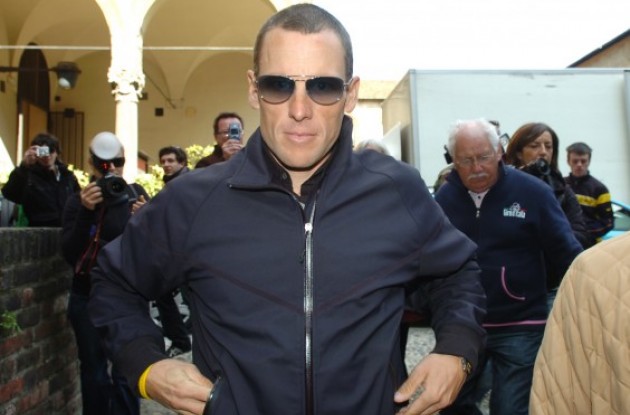US Justice Department joining fraud suit against Lance Armstrong
The lawsuit alleges that riders on the postal service-sponsored team, including Armstrong, knowingly violated their postal service agreements by regularly using banned substances and methods to enhance their performance.
"Lance Armstrong and his cycling team took more than US$30 million from the U.S. Postal Service based on their contractual promise to play fair and abide by the rules -- including the rules against doping," said U.S. Attorney Ronald Machen, whose office is handling the case. "The Postal Service has now seen its sponsorship unfairly associated with what has been described as 'the most sophisticated, professionalized and successful doping program that sport has ever seen.'"
In recent weeks, settlement discussions had been under way between the Justice Department and Armstrong's lawyers. A person familiar with the negotiations said Friday the two sides are tens of millions of dollars apart on how much Armstrong should pay to settle the case. The person spoke on condition of anonymity because the source was not authorized to speak on the record about the private talks.
From 1996 through 2004, the postal service sponsored a professional cycling team run by Tailwind Sports Corporation, and Armstrong was the lead rider. From 1999 to 2004, he won six consecutive Tour de France titles. The suit also said Johan Bruyneel, the team's manager, knew that team members were using performance-enhancing substances and facilitated the practice.
The Justice Department notified the federal court that it is joining the lawsuit against Armstrong, Bruyneel and Tailwind, and will file its formal complaint within 60 days.
In announcing it was joining the case, the Justice Department emphasized Armstrong's concealment of his activities and said the cover-up went back to at least 1998.
"The U.S. Postal Service Cycling Team was run as a fraudulent enterprise and individuals both inside and outside of sport aided and abetted this scheme and profited greatly," said Travis Tygart, CEO of the U.S. Anti-Doping Agency. "USADA applauds today's action by the U.S. Department of Justice which holds promise for returning the many millions of federal dollars in ill-gotten gains generated by this fraud."
Last month, USADA lobbied Attorney General Eric Holder for the Justice Department to join the lawsuit against Armstrong. It was USADA's investigative report in October that led to Armstrong being stripped of his medals.
An Armstrong lawyer, Robert Luskin, said negotiations with the government failed because "we disagree about whether the postal service was damaged."
"The postal service's own studies show that the service benefited tremendously from its sponsorship -- benefits totaling more than $100 million," said Luskin.
Luskin said that "Lance and his representatives worked constructively over these last weeks with federal lawyers to resolve this case fairly."
The suit the Justice Department is joining was filed under seal in 2010 by former teammate Floyd Landis, who was stripped of his 2006 Tour de France title for doping. Under the False Claims Act, private citizens can act as whistle-blowers and sue to recover money they believe was obtained through fraud against the federal government. These suits remain under seal until the Justice Department decides whether it thinks there is enough merit in the case to take it over. The private whistle-blower receives a percentage of any money ultimately recovered.
In his 2010 complaint, which was made public Friday, Landis gave a detailed account of what he alleged had been widespread use of performance-enhancing drugs by Armstrong and assistance from Bruyneel and others to carry out the drug use.
During the 2002 Tour de France, Landis and Armstrong lay on opposite sides of a bed to receive re-infusions of a half-liter of blood each, Landis' complaint said. During the banned procedure, Bruyneel sat in a chair watching and commented on how well the two were going to do in a time trial the following day, according to Landis.
In Spain, Landis went to Armstrong's apartment, where Landis met now-banned Italian physician Michele Ferrari, who drew half a liter of blood and placed it in a refrigerator. Armstrong then asked Landis to stay in the apartment to check the temperature of the blood each day while Armstrong went away for a few weeks to train.
In 2003, the withdrawal of two units of blood had left Landis in need of EPO to stimulate the production of red blood cells. Landis went to Armstrong's apartment, where Armstrong handed him a box of EPO, which Landis then used intravenously for several weeks during training for the Vuelta a Espana, a Grand Tour in Spain.
In 2004 for the Tour de France, Armstrong, Landis and seven teammates took blood transfusions on the team bus on a ride from the finish of one stage of the race to the hotel. To conduct the transfusions, the bus driver pulled over to the side of a remote mountain road for an hour, feigning engine trouble.
Armstrong was the subject of a two-year federal grand jury investigation that the Justice Department dropped a year ago without an indictment.
Throughout his career, Armstrong always denied drug use, but he confessed to having done so in an interview last month.
In October, USADA released a report that included affidavits from eleven of Armstrong's former teammates. These affidavits detailed how the teammates were supplied with EPO -- a banned hormone that increases oxygen-carrying red blood cells to boost endurance, particularly in thin mountain air -- by Armstrong and saw him inject, and how they were pressured to dope and bullied by Armstrong and Bruyneel. The cycling world's governing body, UCI, then reluctantly took away from Armstrong the seven Tour de France titles he won from 1999 to 2005.
Armstrong and USADA officials talked on and off over a couple of months about the terms under which the cyclist might sit down for a long interview to tell all he knows about doping in cycling, but Armstrong finally announced he would not cooperate.
A person familiar with discussions between Armstrong and USADA, who spoke on condition of anonymity because the discussions were private, said among the topics was how much protection USADA could provide Armstrong in the whistle-blower case and against possible criminal action. The cyclist and his attorneys were not satisfied with USADA's offer, the person said.
Commenting Wednesday on Armstrong's refusal to talk, Tygart said that, "over the last few weeks he has led us to believe that he wanted to come in and assist USADA but was worried of potential criminal and civil liability if he did so."
If the Justice Department ends up taking the Landis whistle-blower case all the way to trial, a key issue is likely to be whether the U.S. Postal Service -- the Armstrong team's sponsor -- suffered financial harm from the drug scandal.
The government must prove not only that the postal service was defrauded, but that it was damaged somehow.
Studies done for the postal service conclude the agency reaped at least US$139 million in worldwide brand exposure in four years -- US$35 million to US$40 million for sponsoring the Armstrong team in 2001; US$38 million to US$42 million in 2002; US$31 million in 2003; and US$34.6 million in 2004.
The government could counter that all of the recent controversy tarnishes the whole sponsorship and has damaged the postal service.
Armstrong's last sponsor for his final two Tours de France participations and seasons was RadioShack, in 2009 and 2010. Some experts are claiming Armstrong was doped in 2009 and 2010 as well.
The government has a potentially strong weapon on its side: An argument could be made that until recent months there was an active, ongoing conspiracy to cover up Armstrong's alleged fraud. If the case ever goes to trial, that argument could persuade a judge to allow in a huge amount of evidence on Armstrong's use of performance-enhancing drugs dating back to the 1990s -- evidence that would be barred from the government's court case as too old if there were no extended conspiracy.








